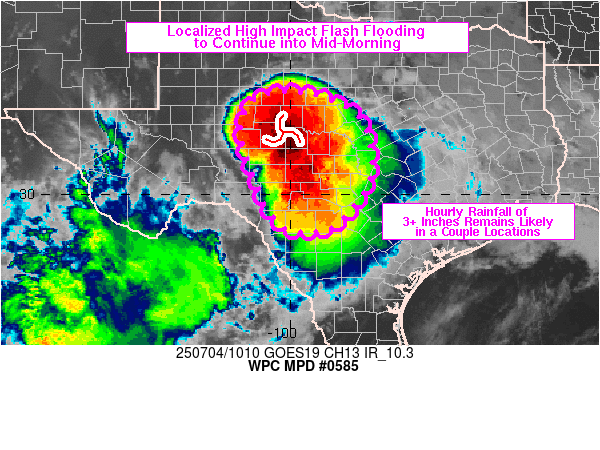
In the swirl of anguish about deadly flooding in central Texas, it’s tempting to jump to conclusions. Disasters like this are ideal opportunities for misinformation and disinformation, casting of blame, and pointing of fingers.
If you live somewhere else that is flood-prone, you might want to keep an eye on how this news unfolds. Every flood can offer some lessons for coping with another one somewhere else in the future.
Like many other people, I look at how badly DJT eviscerated National Oceanic & Atmospheric Administration and National Weather Service, and my first impulse is to think that must have caused NWS to fail to warn anyone.
My first impulse is wrong. As far as I can tell, the National Weather Service did its job.
NWS predicted heavy rain. NWS underestimated how much rain would fall, but its estimate was enough to indicate significant risk of flash flooding in that terrain. NWS issued a flood watch at 13:18 Thursday, predicting up to 7 inches of rainfall early the next day in central Texas. Instead up to 11 or 12 inches of rain fell—overnight, mainly after midnight, while most people were sleeping.
NWS issued alerts. The first was at 01:14 Friday. Nine updates went out on Friday too. Each alert went out through the Emergency Alert System (radio and television) and Wireless Emergency Alerts (pushed to cell phones).
In the folded terrain of the Hill Country, it doesn’t take much to cause flash flooding. Water gets funneled into channels. Its rise is magnified and it roars through.
Most people don’t stay glued to a radio or television or internet 24 hours a day when the heavens open. If they are at summer camp, they may not be tuned in at all. In my teens, when friends and I were at summer camp, we were there for tromping in the woods, canoeing, wilderness stuff. Nobody brought a radio.
Some people get the weather forecast on the evening news. If they are in a vulnerable location, they know to move to higher ground for heavy rain. But not everybody has a cell phone or a radio that receives weather alerts. (If you aren’t in the USA, a “weather radio” can “turn itself on” when an emergency alert signal is broadcast and deliver the message to you. It emits an ear-piercing attention tone first. Weather radios are essential in areas that get tornadoes. They wake you up so you can run to your tornado shelter.) State and local officials know where vulnerable areas are. Authorities acting on the NWS warnings can reach into those areas to warn people who wouldn’t otherwise know what’s going on, and in some places they do.
That said, I’ve been through a few floods, nearly all in Texas, with the good fortune to emerge intact. None of “my” floods were preceded by warnings other than the weather forecast on the news. Forecasting rainfall amounts is an imperfect science, so one in particular surprised everyone with its scale. The National Guard went down my street, gathering people from flooded houses to take them to emergency shelter after the water went down. I have been thinking about those floods, and—with sorrow—about people who died in this one… especially kids at summer camp and the counselors with them.
It’s terrible. But it wasn’t NWS’ fault. They fulfilled their role.
Sometimes, maybe this time, tragedy happens and no one is to blame for it.
Of all the media coverage I’ve seen about the Texas floods, the best has been in the Texas Tribune. Click here to read it. There is no paywall.
—
Postscript: Hurricane season will be another matter. NWS had their usual data for this weather event and the nearest NWS offices were not as badly understaffed as some others.
For hurricane predictions, NOAA and NWS were stripped of one of their most valuable data sources just as the season began. Everyone has gotten spoiled to how much better hurricane forecasting has become over the past 20 years. That’s gone now.
We can look at that some other day, after we know how much grief this weekend’s flood has caused.




It sounds like local authorities didn’t take even a six inch forecast seriously enough. I wonder if cell alerts were out of range for those who were affected. Such a heartbreaking tragedy.